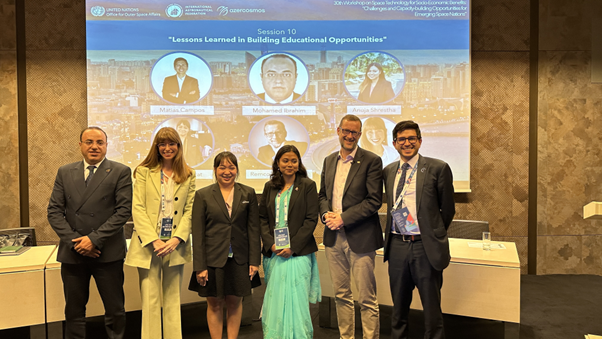Last week, for the first time, I really felt the benefits of my Toastmasters public speaking training.
I joined toastmasters on the edge of the pandemic, with a mix of online and masked in-person meetings at my local club. Like many of my club mates, I am a natural introvert, who recognises the importance of being able to confidently speak in public. Also, like many in my club I am not a native English speaker, so I treasure the opportunity to improve my English.
I clearly remember my first public speaking experience. I foolishly agreed to be the presenter of my primary school graduation event, where I moderated an evening for my classmates’ parents in the local theatre, whilst also having a role in the musical itself. I was terrified. My mum helped me calm my nerves, but it was not easy, and I embarrassingly stumbled my way through the evening, hoping nobody would remember.
This terrible experience prevented me from taking any speaking assignments for many years, until I ended up in the corporate world, where I got involved in project group discussions and board meetings, and I was asked to present technical projects to increasingly large groups of staff. I found that when speaking about technical topics that I well understood, to a safe, captive audience of fellow professionals, I was not laughed at, and could engage in meaningful debates. I felt my nervousness dropping with every opportunity.
As things go, I then moved into a job that included much bigger public speaking challenges. I got involved in social media communication and online marketing, which initially consisted of writing text messages, often fluffed up with photographs and infographics. But anyone familiar with the online media industry knows that nowadays video rules.
I withstood the pressure to move into video until a few years ago. I started experimenting with explainer videos at events and got immediate success. Supported largely by positive feedback from my partner, I continued making short ‘citizen journalist’ videos from events, which became increasingly well viewed by my online audiences.
This initial success became my reason to join Toastmasters. The type of videos that I produce are basically a series of table topics, where I ask myself a simple question, which I answer from the top of my head, in a single take, which I then immediately post online. Speed of posting and authenticity are critical, so I need to be confident, seem knowledgeable, have a structure, and have a clear take away point. These are all things that Toastmasters teaches, so I am finding great value in my pathway and the feedback I receive at my club meetings.
Now Table Topics is one thing, but full-blown speeches are another. A few weeks ago, I was invited to present at a workshop organised by the United Nations. This annual workshop, about ‘Space technology for the benefit of socio-economic development’ is held in a different country every year. It consists of a series of presentations and panel discussions with specialists from all over the world, and I was selected to be one of the speakers and panellists on the topic of space education, with an opportunity to give a 10-minute speech in front of a global audience of about 200 people, in Azerbaijan, of all places.
The presentation format was very traditional. Five or six speakers behind a table on stage, all working their way through text-heavy PowerPoint presentations on incredibly detailed topics, most of them reading their slides from a laptop in front of them, basically breaking all the rules and ignoring all the good advice that Toastmasters provides.



I decided to do things differently. I removed all but the most essential bullet points from my slides, leaving a few images only. I learned my speech by heart, which I find very difficult and is by far my most frequent topic of feedback at the Toastmasters meetings. I stood up from the safety of the table and my laptop, to face the audience from the edge of the stage, looking them directly in the eyes. I started with a question. I introduced short silences after important points. In contrast to some other speakers, I actually HAD a point. I closed with a simple take away message. I even finished exactly when the 10-minute countdown clock ticked zero. All used all the ‘tricks’ I learned from Toastmasters.
And it worked. I noticed people in the audience actually paid attention. They looked at me instead of their phone. They replied in silence to some of my reciprocal questions. They seemed engaged, nodding, laughing, clapping after some statements.
But the biggest proof was after the presentation, and after the event was over. Many people came to me to share their positive feedback, saying this was the best presentation of all, and how my point came across so clearly. The organisers told me how much they appreciated my presence, hoping I would consider coming back next year. And most importantly, several key decision makers continued the discussion about the point that I had made, triggering the debate I had intended to provoke.
From Toastmasters to the United Nations. I am thankful for the knowledge and methodology that Toastmasters provides. It may seem simple and small in our club meetings, but the impact is profound and worldwide.
Thank you, Didcot Speakers!
Remco Timmermans
Didcot Speakers

